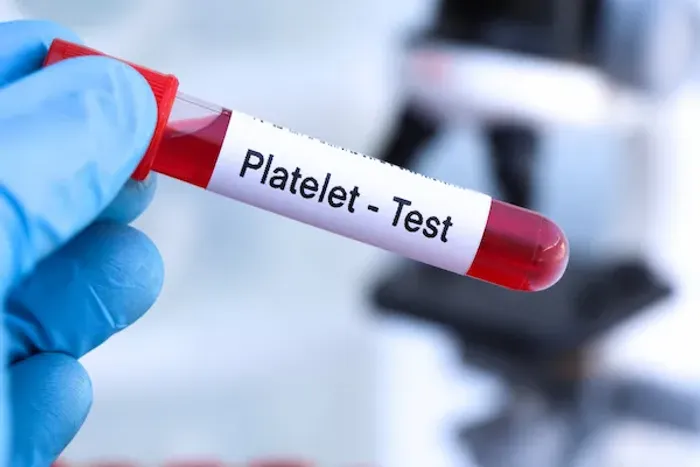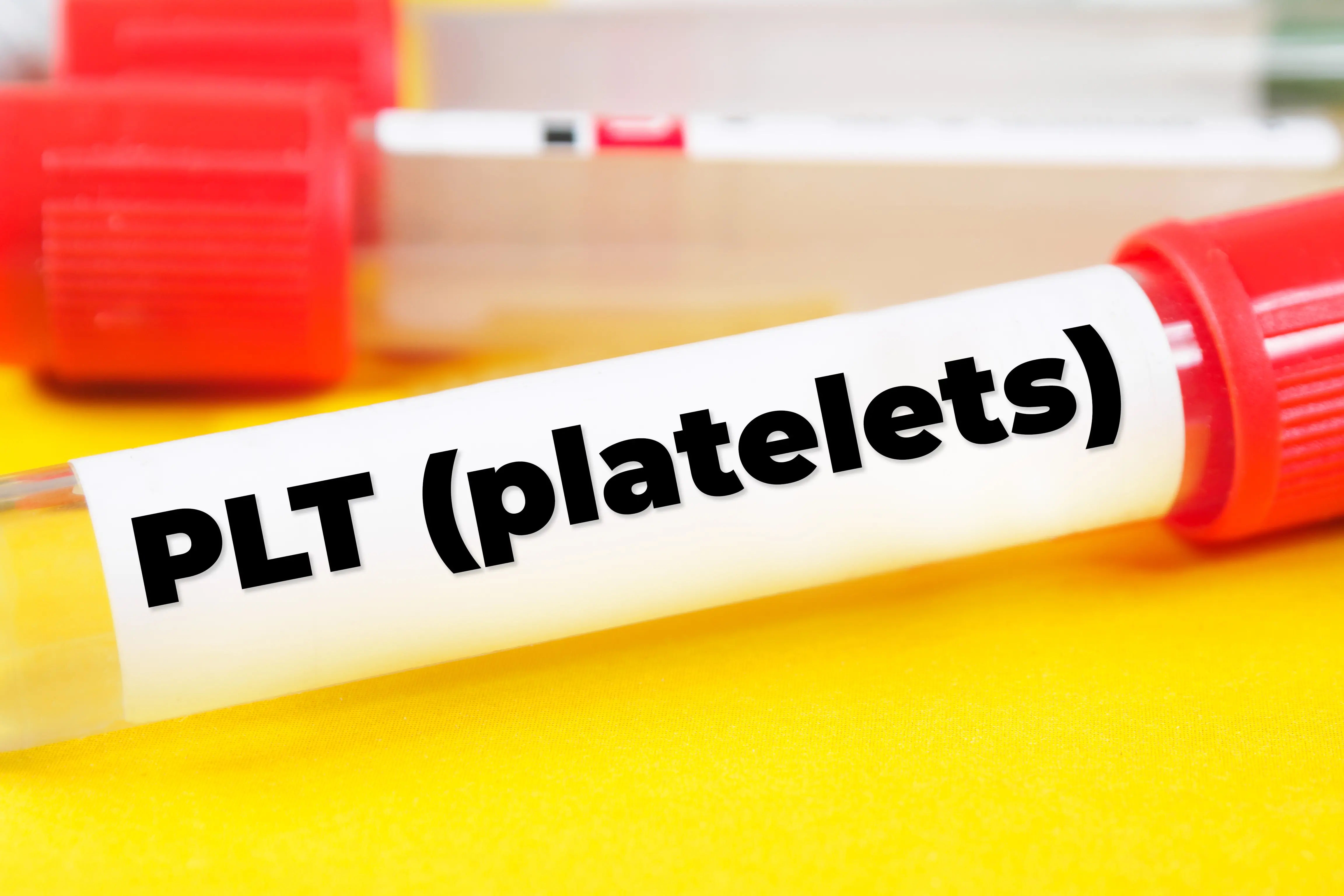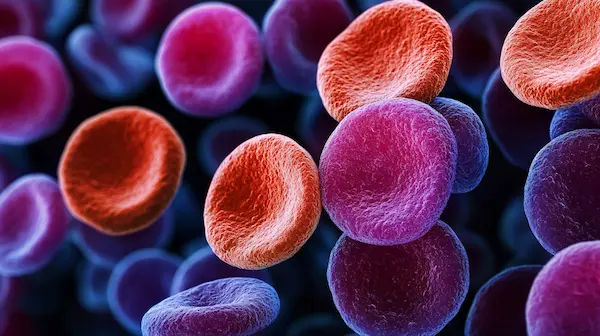Platelet Count and Its Normal Range
Learn about platelet count, its normal range, and why it’s important for blood clotting and overall health. Understand what high or low platelet levels may indicate.

Written by Dr. Rohinipriyanka Pondugula
Reviewed by Dr. Vasanthasree Nair MBBS
Last updated on 13th Aug, 2025

Platelets are tiny, disc-shaped cells in your blood that play a crucial role in clotting and preventing excessive bleeding. A healthy platelet count ensures that your body can heal wounds and stop bleeding effectively. But what happens when your platelet count is too high or too low? In this article, we’ll explain what platelet count means, its normal range, and what you should do if your levels are abnormal.
What Is a Platelet Count?
A platelet count is a blood test that measures the number of platelets in your blood. Platelets (also called thrombocytes) help form clots to stop bleeding when you’re injured. If your platelet count is too low, you may bleed excessively, while a high platelet count can increase the risk of blood clots.
Consult a Top Specialist
Normal Platelet Count Range
The normal platelet count for a healthy adult ranges between 150,000 to 450,000 platelets per microliter (µL) of blood. However, slight variations can occur based on age, gender, and individual health conditions.
- Low Platelet Count (Thrombocytopenia): Below 150,000/µL
- High Platelet Count (Thrombocytosis): Above 450,000/µL
Symptoms of Abnormal Platelet Levels
Below are the symptoms of abnormal platelet levels,
Low Platelet Count (Thrombocytopenia)
- Easy bruising
- Prolonged bleeding from cuts
- Frequent nosebleeds or gum bleeding
- Tiny red or purple spots on the skin (petechiae)
- Heavy menstrual bleeding in women
High Platelet Count (Thrombocytosis)
- Headaches or dizziness
- Weakness or fatigue
- Numbness or tingling in hands and feet
- Blood clots (which can lead to stroke or heart attack in severe cases)
Causes of Abnormal Platelet Count
Below are the causes of abnormal platelet levels,
Low Platelet Count Causes
- Bone marrow disorders (leukemia, aplastic anemia)
- Autoimmune diseases (like ITP – Immune Thrombocytopenia)
- Viral infections (dengue, HIV, hepatitis C)
- Chemotherapy or radiation therapy
- Certain medications (like blood thinners)
- Pregnancy (mild thrombocytopenia can occur)
High Platelet Count Causes
- Chronic inflammation (rheumatoid arthritis, inflammatory bowel disease)
- Iron deficiency anemia
- Infections or recent surgery
- Bone marrow disorders (essential thrombocythemia)
- Cancer (some types can increase platelet production)
How to Maintain a Healthy Platelet Count?
If your platelet count is abnormal, your doctor may recommend treatments like medications, blood transfusions, or lifestyle changes. Here are some general tips:
For Low Platelet Count
- Eat a balanced diet rich in vitamin B12, folate, and iron (leafy greens, eggs, lean meats).
- Avoid alcohol and certain painkillers (like aspirin) that can worsen bleeding.
- Be cautious with activities that may cause injuries (contact sports, shaving with a razor).
- Stay hydrated to support blood circulation.
For High Platelet Count
- Stay active to improve blood flow and reduce clotting risks.
- Drink plenty of water to prevent blood thickening.
- Limit high-cholesterol foods (fried foods, processed meats).
- Follow your doctor’s advice if you need blood-thinning medications.
When to See a Doctor?
If you experience symptoms like unexplained bruising, excessive bleeding, or frequent headaches with dizziness, consult a doctor immediately. A simple Complete Blood Count (CBC) test can check your platelet levels.
Book a Test or Consultation with Apollo 24|7
If you suspect an issue with your platelet count, you can easily book a blood test or consult a hematologist through Apollo 24|7. Early diagnosis and treatment can prevent complications.
Get Your Health Assessed
Final Thoughts
Your platelet count is a vital indicator of your blood health. While minor fluctuations can be normal, persistent abnormalities need medical attention. By maintaining a healthy lifestyle and getting regular check-ups, you can keep your platelet levels in balance. If you have concerns about your platelet count, don’t hesitate to reach out to a healthcare professional.
Consult a Top Specialist
Consult a Top Specialist

Dr. Syed Ismail Ali
General Practitioner
7 Years • MBBS
Hyderabad
Apollo 24|7 Clinic, Hyderabad

Dr D M Karthik
General Practitioner
4 Years • MBBS, Fellowship in Diabetes Mellitus, Advance certificate in Diabetes Mellitus, Derma Nutrition Certification
Visakhapatnam
Apollo 24|7 Clinic - Andhra Pradesh, Visakhapatnam

Dr. M L Ezhilarasan
General Practitioner
6 Years • MBBS
Visakhapatnam
Apollo 24|7 Clinic - Andhra Pradesh, Visakhapatnam

Dr. Mohammed Kamran
General Practitioner
5 Years • MBBS, FIDM
Nashik
Apollo 24|7 Clinic - Maharashtra, Nashik

Dr. Suraja Nutulapati
General Physician/ Internal Medicine Specialist
10 Years • MBBS, MD (Internal Medicine)
Hyderabad
Apollo 24|7 Clinic, Hyderabad
(975+ Patients)
Consult a Top Specialist

Dr. Syed Ismail Ali
General Practitioner
7 Years • MBBS
Hyderabad
Apollo 24|7 Clinic, Hyderabad

Dr D M Karthik
General Practitioner
4 Years • MBBS, Fellowship in Diabetes Mellitus, Advance certificate in Diabetes Mellitus, Derma Nutrition Certification
Visakhapatnam
Apollo 24|7 Clinic - Andhra Pradesh, Visakhapatnam

Dr. M L Ezhilarasan
General Practitioner
6 Years • MBBS
Visakhapatnam
Apollo 24|7 Clinic - Andhra Pradesh, Visakhapatnam

Dr. Mohammed Kamran
General Practitioner
5 Years • MBBS, FIDM
Nashik
Apollo 24|7 Clinic - Maharashtra, Nashik

Dr. Suraja Nutulapati
General Physician/ Internal Medicine Specialist
10 Years • MBBS, MD (Internal Medicine)
Hyderabad
Apollo 24|7 Clinic, Hyderabad
(975+ Patients)



